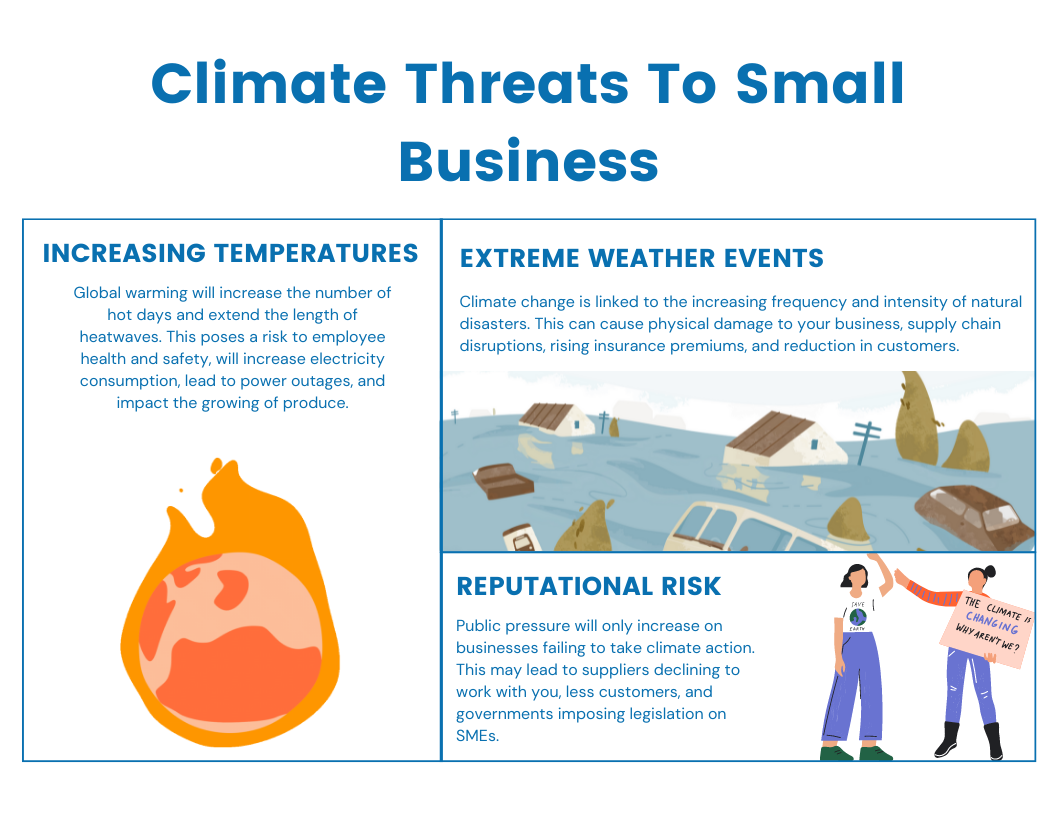Revising Your Risk Management Plan To Include Climate Change
December 2, 2022
Before the recent two years’ of floods, there was a summer of devastating fires that was preceded by years of drought in the east and cyclones of increasing intensity in the north and west. Everyone in the affected communities who owns or works in a small business has felt the impact of climate change on their livelihoods.
Each business is unique in its location, operations, industry, and supply chains, bringing with it a unique climate risk profile. But every business would benefit from spending some time reviewing its risk management plan to try and mitigate their losses in the future.
To begin the risk review process, Business Foundations has outlined some of the specific risks posed by climate change to small businesses, and outlined how they may effect your business.
Increasing Temperatures
The increase in average temperatures due to global warming will both increase the number of hot days and extend the length of heatwaves in the future. It may lead to the following impacts on your business:
Direct Impacts
- Increasing your air-conditioning use to ensure the comfort of your employees and customers will drive up your operational expenses;
- Productivity may decrease where employees are working in high temperature environments;
- Employees working outdoors will require further PPE and breaks to protect them from the harsh, hot sun. This will incur additional expenses to your business;
- Current stock storage facilities may be ill-equipped to handle rising temperatures, and to avoid wastage your business may need to install further insulation or climate control; and
- Increasing temperatures can impact the growing of wine and produce, which can lead to smaller harvests or shorter growing seasons.
Indirect Impacts
- Rising temperatures may impede your employees’ comfort, affecting their health and wellbeing; and
- Increasing widespread air-conditioning use may put strain on the power grid, leading to more frequent power outages that impact business operations.
Extreme Weather Events
Climate change is linked to the increasing frequency and intensity of extreme weather events, including floods, bushfires, cyclones and droughts. Extreme weather events may also appear in succession, such as a flood after a cyclone.
These will only disrupt business operations more in the coming years and have the ability to cause significant financial and physical damage. Their impacts include:
Direct Impacts
- Floods, Bushfires, or Cyclones could inflict physical damage to your business – forcing you to close or lose stock and equipment; and
- Increasing need to weatherproof buildings and storage facilities, incurring high costs to your business.
Indirect Impacts
- Extreme weather events can disrupt your business’ supply chain, even if they occur elsewhere in Australia. A recent example of this was the February 2022 flood in South Australia that washed out 300km of the only rail line that supplies food and other goods into Western Australia from the eastern states. Even if supplies are still accessible, pressures of demand may lead to price gouging;
- Less tourists and visitors may come to areas impacted by extreme weather events, impacting business patronage. This can be especially impactful on the tourism industry; and
- Rising insurance premiums, or lack of insurance availability, associated with extreme weather event cover.
Consumer Demand For Action
As the impacts of climate change become more pronounced, more people will expect businesses to show how they are taking steps to reduce their climate impact, or face public scrutiny, causing the following impacts:
Direct Impacts
- Suppliers may choose not to supply to businesses who are actively contributing to climate change;
- Customers may forgo your business in favour of those who are not contributing to climate change or are actively trying to mitigate it; and
- Governments may impose legislation that requires your business to dramatically alter its operations to become more sustainable, which may come at a significant time and monetary cost if your business is ill-prepared.

This list of risks is the starting point for the additions to your risk management plan. A good place to start to develop the plan is to get your team together and:
- Discuss the risk and ideas to mitigate it;
- Create a ‘to do’ list of activities and assign them to team members with deadlines; and
- Have regular meetings to review the list, adjust it and recognise progress.
Acknowledgement Of Country
Business Foundations acknowledges the traditional custodians throughout Western Australia and their continuing connection to the land, waters and community. We pay our respects to all members of the Aboriginal communities and their cultures; and to Elders both past and present.
Victoria
The Commons
80 Market Street,
South Melbourne VIC 3205
admin@businessfoundations.com.au
Western Australia
Wesley Central
2 Cantonment Street,
Fremantle WA 6160
admin@businessfoundations.com.au


Get In Touch
Have a question or to find out how we can help you, please get in touch.






